On this Day in History ... 21st November
21 Nov is in November.
Events on the 21st November
On 21 Nov 1150 García "Restorer" IV King Navarre (age 38) died. His son Sancho "Wise" King Navarre (age 18) succeeded King Navarre.
On 21 Nov 1499 John de Vere 13th Earl of Oxford (age 57) presided at Westminster Hall [Map] during the Trial and Execution of Perkin Warbreck and Edward Earl of Warwick.
Letters and Papers 1535. 21 Nov 1535. 861. The personage who informed me of what I wrote to your Majesty on the 6th about the Queen and Princess, viz., that the King meant to have them dispatched at this next Parliament, came yesterday into this city in disguise to confirm what she had sent to me to say, and conjure me to warn your Majesty, and beg you most urgently to see to a remedy. She added that the King, seeing some of those to whom he used this language shed tears, said that tears and wry faces were of no avail, because even if he lost his crown he would not forbear to carry his purpose into effect. These are things too monstrous to be believed; but, considering what has passed and goes on daily,—the long continuance of these menaces—and moreover that the concubine (age 34), who long ago conspired the death of the said ladies and thinks of nothing but getting rid of them, is the person who governs everything, and whom the King is unable to contradict,—the matter is very dangerous. The King would fain, as I have already written, make his Parliament participators and even authors of such crimes, in order that, losing all hope of the clemency of your Majesty, the whole people should be the more determined to defend themselves when necessary.
Henry Machyn's Diary. 21 Nov 1557. The Sonday, the xxj day at November, the quen('s) (age 41) grase [did] sett a crowne of master Norrey('s) (age 47) hed kyng at armes, [and] created hym Clarenshus, with a cup of [wine], at Sant James, her grace('s) place.
Note. P. 158. Coronation of Norroy king of arms. The instrument of the creation and coronation of Laurence Dalton to be Norroy king of arms, by letters patent dated 6 Sept. 1557, is printed in Rymer's Fœdera, vol. xv. p. 477; and that for William Harvey to be Clarenceux, dated the next day, in the following page.
On 21 Nov 1582 Diego King Asturias (age 7) died.
On 21 Nov 1625 Maria Eugenia Habsburg Spain was born to Philip IV King Spain (age 20) and Elisabeth Bourbon Queen Consort Spain (age 22). Coefficient of inbreeding 4.39%. 
On 21 Nov 1627 Ferdinand King Bohemia III Holy Roman Emperor (age 19) succeeded King Bohemia.
In Nov 1660 King Charles II of England Scotland and Ireland (age 30) rewarded of further tranche of those who supported his Restoration by awarding them Baronetcies ...
On 08 Nov 1660 William Russell 1st Baronet was created 1st Baronet Russell of Laugherne in Carmarthenshire.
On 12 Nov 1660 John Cutler 1st Baronet (age 57) was created 1st Baronet Cutler of London.
On 21 Nov 1660 John Clotworthy 1st Viscount Massereene was created 1st Viscount Massereene, 1st Baron Lough Neagh, in the Irish peerage, with remainder in default of male heirs to his son-in-law. See Viscountcies of England Created with a Special Remainder.
On 21 Nov 1660 Thomas Foote 1st Baronet (age 62) was created 1st Baronet Foote of London with a special remainder for title to revert on his death to his son-in-law, Arthur Onslow of West Clandon (age 36).
On 29 Nov 1660 John Wroth 1st Baronet (age 33) was created 1st Baronet Wroth of Blenden Hall in Kent.
Pepy's Diary. 21 Nov 1667. Up, and to the office, where all the morning, and at noon home, where my wife not very well, but is to go to Mr. Mills's child's christening, where she is godmother, Sir J. Minnes (age 68) and Sir R. Brookes (age 30) her companions. I left her after dinner (my clerks dining with me) to go with Sir J. Minnes (age 68), and I to the office, where did much business till after candlelight, and then my eyes beginning to fail me, I out and took coach to Arundell House [Map], where the meeting of Gresham College was broke up; but there meeting Creed, I with him to the taverne in St. Clement's Churchyard, where was Deane Wilkins (age 53), Dr. Whistler, Dr. Floyd (age 40), a divine admitted, I perceive, this day, and other brave men; and there, among other things of news, I do hear, that upon the reading of the House of Commons's Reasons of the manner of their proceedings in the business of my Chancellor (age 58), the Reasons were so bad, that my Lord Bristoll (age 55) himself did declare that he would not stand to what he had, and did still, advise the Lords to concur to, upon any of the Reasons of the House of Commons; but if it was put to the question whether it should be done on their Reasons, he would be against them; and indeed it seems the Reasons-however they come to escape the House of Commons, which shews how slightly the greatest matters are done in this world, and even in Parliaments were none of them of strength, but the principle of them untrue; they saying, that where any man is brought before a judge, accused of Treason in general, without specifying the particular, the judge do there constantly and is obliged to commit him. Whereas the question being put by the Lords to my Lord Keeper, he said that quite the contrary was true: and then, in the Sixth Article (I will get a copy of them if I can) there are two or three things strangely asserted to the diminishing of the King's power, as is said, at least things that heretofore would not have been heard of. But then the question being put among the Lords, as my Lord Bristoll (age 55) advised, whether, upon the whole matter and Reasons that had been laid before them, they would commit my Lord Clarendon (age 58), it was carried five to one against it; there being but three Bishops against him, of whom Cosens (age 72) and Dr. Reynolds were two, and I know not the third. This made the opposite Lords, as Bristoll (age 55) and Buckingham (age 39), so mad, that they declared and protested against it, speaking very broad that there was mutiny and rebellion in the hearts of the Lords, and that they desired they might enter their dissents, which they did do, in great fury.


Pepy's Diary. 21 Nov 1667. From this we fell to other discourse, and very good; among the rest they discourse of a man that is a little frantic, that hath been a kind of minister, Dr. Wilkins (age 53) saying that he hath read for him in his church, that is poor and a debauched man, that the College' have hired for 20s. to have some of the blood of a sheep let into his body; and it is to be done on Saturday next1. They purpose to let in about twelve ounces; which, they compute, is what will be let in in a minute's time by a watch. They differ in the opinion they have of the effects of it; some think it may have a good effect upon him as a frantic man by cooling his blood, others that it will not have any effect at all. But the man is a healthy man, and by this means will be able to give an account what alteration, if any, he do find in himself, and so may be usefull. On this occasion, Dr. Whistler told a pretty story related by Muffet, a good author, of Dr. Caius, that built Keys College; that, being very old, and living only at that time upon woman's milk, he, while he fed upon the milk of an angry, fretful woman, was so himself; and then, being advised to take it of a good-natured, patient woman, he did become so, beyond the common temper of his age. Thus much nutriment, they observed, might do. Their discourse was very fine; and if I should be put out of my office, I do take great content in the liberty I shall be at of frequenting these gentlemen's company. Broke up thence and home, and there to my wife in her chamber, who is not well (of those), and there she tells me great stories of the gossiping women of the parish-what this, and what that woman was; and, among the rest, how Mrs. Hollworthy is the veriest confident bragging gossip of them all, which I should not have believed; but that Sir R. Brookes (age 30), her partner, was mighty civil to her, and taken with her, and what not. My eyes being bad I spent the evening with her in her chamber talking and inventing a cypher to put on a piece of plate, which I must give, better than ordinary, to the Parson's child, and so to bed, and through my wife's illness had a bad night of it, and she a worse, poor wretch!
Note 1. This was Arthur Coga, who had studied at Cambridge, and was said to be a bachelor of divinity. He was indigent, and "looked upon as a very freakish and extravagant man". Dr. King, in a letter to the Hon. Robert Boyle (age 40), remarks "that Mr. Coga was about thirty-two years of age; that he spoke Latin well, when he was in company, which he liked, but that his brain was sometimes a little too warm". The experiment was performed on November 23rd, 1667, by Dr. King, at Arundel House, in the presence of many spectators of quality, and four or five physicians. Coga wrote a description of his own case in Latin, and when asked why he had not the blood of some other creature, instead of that of a sheep, transfused into him, answered, "Sanguis ovis symbolicam quandam facultatem habet cum sanguine Christi, quia Christus est agnus Dei" [Note. "Sheep's blood has some symbolic power, like the blood of Christ, for Christ is the Lamb of God."] (Birch's "History of the Royal Society", vol. ii., pp. 214-16). Coga was the first person in England to be experimented upon; previous experiments were made by the transfusion of the blood of one dog into another. See November 14th, 1666 (vol. vi., p. 64).
On 21 Nov 1747 Joseph Farington was born.
On 21 Nov 1761 Dorothea Bland aka "Mrs Jordan" was born near Waterford, County Waterford. On 05 Dec 1761 she was baptised at St Martin in the Fields [Map].
Archaeologia Volume 12 Section I. Antiquities discovered in Derbyshire. In a Letter from Hayman Rooke (age 70), Esq. F. S. A. to the Rev. Dr. Pegge (age 89), F. S. A. Read November 21, 1793.
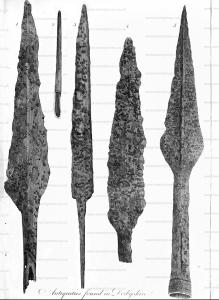
On 21 Nov 1827 Elizabeth Montagu Duchess Buccleuch (age 84) died. Monument in St Edmund's Church, Warkton [Map]. Sculpted by Thomas Campbell (age 37). Erected by her grandson Francis Scott 2nd Duke Buccleuch. The quotation upon her monument from Book of the Acts of the Apostles Chapter 10 Verses 31: "Thine alms are had in remembrance in the sight of God".

Elizabeth Montagu Duchess Buccleuch:
On 29 May 1743 she was born to George Brudenell aka Montagu 1st Duke Montagu and Mary Montagu Duchess of Montagu.
 On 02 May 1767 Henry Scott 3rd Duke Buccleuch and she were married at Montagu House Whitehall Palace. She by marriage Duchess Buccleuch. She the daughter of George Brudenell aka Montagu 1st Duke Montagu and Mary Montagu Duchess of Montagu. They were fourth cousins. He a great x 3 grandson of King Charles II of England Scotland and Ireland.
On 02 May 1767 Henry Scott 3rd Duke Buccleuch and she were married at Montagu House Whitehall Palace. She by marriage Duchess Buccleuch. She the daughter of George Brudenell aka Montagu 1st Duke Montagu and Mary Montagu Duchess of Montagu. They were fourth cousins. He a great x 3 grandson of King Charles II of England Scotland and Ireland. 


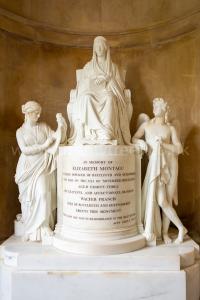
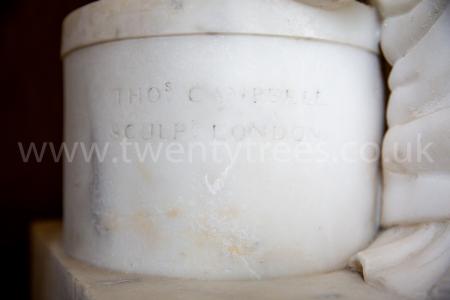
On 21 Nov 1840 Victoria Empress Germany Queen Consort Prussia was born to Prince Albert Saxe Coburg Gotha (age 21) and Queen Victoria of the United Kingdom (age 21). Coefficient of inbreeding 7.16%. 
On 21 Nov 1872 Richard James Lane (age 72) died.
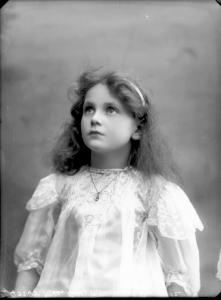 21 Nov 1910. Bassano Ltd. Photograph of Betty Constance Manners (age 21)
21 Nov 1910. Bassano Ltd. Photograph of Betty Constance Manners (age 21)
Betty Constance Manners:
On 15 Jun 1889 she was born to John Manners-Sutton 3rd Baron Manners and Constance Hamlyn-Fane Baroness Manners.
 On 30 Apr 1918 Commander Arthur Asquith and she were married. He the son of Herbert Henry Asquith 1st Earl of Oxford and Asquith and Helen Kelsall Melland.
On 30 Apr 1918 Commander Arthur Asquith and she were married. He the son of Herbert Henry Asquith 1st Earl of Oxford and Asquith and Helen Kelsall Melland. On 12 Sep 1962 Betty Constance Manners died.
On 12 Sep 1962 Betty Constance Manners died.
After 1917. St Barnabas Church, Stock Gaylard [Map]. Memorial to Captain Harry Farr Yeatman. Son of Harry Yeatman RN 1839-1884 whose memorial is above. Captain in the Dorsetshire Yeomanry. Killed 21st November 1917 in sight of Jerusalem. Buried Jerusalem.
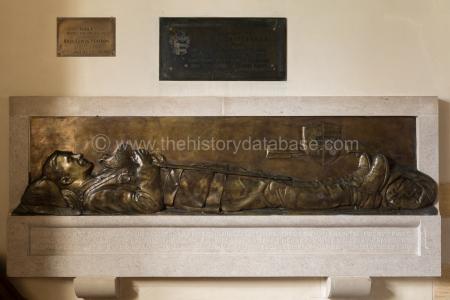
On 21 Nov 1933 Frederick Hollyer (age 95) died.
On 21 Nov 2005 Thomas Patrick John Anson 5th Earl Lichfield (deceased) was buried at St Michael and All Angels Church, Colwich [Map]. The Memorial Stone placed by his partner Annunziata Asquith (age 57). His sister Elizabeth Georgiana Anson Lady Shakerley (age 64), his former wife Leonora Mary Grosvenor Countess Lichfield (age 56), his son Thomas Anson 6th Earl of Lichfield (age 27), and his two daughters Rose and Eloise attended.
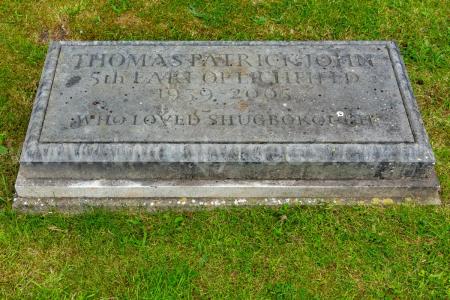
Births on the 21st November
On 21 Nov 1264 Maria Burgundy was born to Alfonso III King Portugal (age 54) and Beatrice Queen Consort Portugal (age 22). She a great x 2 granddaughter of King Henry "Curtmantle" II of England. Coefficient of inbreeding 2.41%. 

On 21 Nov 1375 Philippa Mortimer Countess Pembroke, Arundel and Surrey was born to Edmund Mortimer 3rd Earl March, Earl Ulster (age 23) and Philippa Plantagenet Countess March 5th Countess Ulster (age 20). She a great granddaughter of King Edward III of England.

On 21 Nov 1558 Godfrey Foljambe was born to Godfrey Foljambe (age 31) and Troth Tyrwhitt (age 24) at Walton [Map].
On 21 Nov 1618 Colonel John Lamplugh of Lamplugh Hall in Cumberland was born to John Lamplugh (age 31) and Elizabeth Musgrave.
On 21 Nov 1625 Maria Eugenia Habsburg Spain was born to Philip IV King Spain (age 20) and Elisabeth Bourbon Queen Consort Spain (age 22). Coefficient of inbreeding 4.39%. 
On 12 Nov 1705 Mary Boscawen was born to Hugh Boscawen 1st Viscount Falmouth (age 25) and Charlotte Godfrey Viscountess Falmouth. She was baptised on 21 Nov 1705 at St James' Church, Piccadilly.
On or before 21 Nov 1722 Richard Warwick Bampfylde 4th Baronet was born to Coplestone Warwick Bamfylde 3rd Baronet (age 32) and Gertrude Carew Lady Coplestone Lady Copley Sprotborough (age 40). He was baptised 21 Nov 1722.
On 21 Nov 1742 Edmund Boyle 7th Earl Cork was born to John Boyle 5th Earl Cork (age 35) and Henrietta Hamilton Countess Cork.

On 21 Nov 1747 Joseph Farington was born.
On 21 Nov 1751 Karl Wilhelm Ferdinand Saxe Coburg Gotha was born to Ernest Frederick Saxe Coburg Saalfeld Duke Saxe Coburg Saalfeld (age 27) and Sophia Antonia Brunswick-Wolfenbüttel Duchess Saxe Coburg Saalfeld (age 27) at Coburg.
On 21 Nov 1758 Frances Beauchamp-Proctor was born to William Beauchamp-Proctor 1st Baronet (age 36) and Jane Tower Lady Beauchamp-Proctor (age 34).
On 21 Nov 1758 Joseph Strutt was born to John Strutt of Terling Place in Essex (age 31) and Anne Goodday.
On 21 Nov 1761 Dorothea Bland aka "Mrs Jordan" was born near Waterford, County Waterford. On 05 Dec 1761 she was baptised at St Martin in the Fields [Map].
On 21 Nov 1765 Bernard Howard 12th Duke of Norfolk was born to Henry Howard (age 52) and Julia Molyneux (age 22).

On 21 Nov 1773 Henry Vassal-Fox 3rd Baron Holland was born to Stephen Fox 2nd Baron Holland (age 28) and Mary Fitzpatrick (age 23). He a great x 3 grandson of King Charles II of England Scotland and Ireland.
On 21 Nov 1773 Henry Vassall Fox 3rd Baron Holland was born.
On 21 Nov 1787 Samuel Cunard 1st Baronet was born.
On 21 Nov 1790 Edmund Lyons 1st Baron Lyons was born.
On 21 Nov 1796 Francis Fitzherbert was born to Basil Fitzherbert (age 48).
On 21 Nov 1823 Gerald Normanby Dillon was born to Henry Augustus Dillon Lee 13th Viscount Dillon (age 46).
On 21 Nov 1824 Hannah Louisa Blyth was born.
On 12 Nov 1835 Captain Henry John Fane was born to Henry Fane (age 33) and Christine Isabelle Roche aka O'Shea at Calcutta, India. He was baptised 21 Nov 1835. The descent somewhat speculative based on the memorial at St Nicholas' Church, Fulbeck in which Major-General Vere Bonamy Fane is described as the son of Captain Henry John Fane of the Dorset Regiment. There is no explicit evidence that Captain Henry John Fane is one of the illegitimate sons of General Henry Fane (age 56) and Isabella Gorges.

On 21 Nov 1840 Victoria Empress Germany Queen Consort Prussia was born to Prince Albert Saxe Coburg Gotha (age 21) and Queen Victoria of the United Kingdom (age 21). Coefficient of inbreeding 7.16%. 
On 21 Nov 1843 Albert Leveson-Gower was born to George Sutherland Leveson-Gower 2nd Duke Sutherland (age 57) and Harriet Elizabeth Georgiana Howard Duchess Sutherland (age 37). Coefficient of inbreeding 3.22%. 
On 21 Nov 1847 William ffolkes 3rd Baronet was born to Martin William Browne ffolkes.
On 21 Nov 1856 Cicely Elizabeth Adeliza Manners was born to George John Manners (age 36) and Adeliza Matilda Fitzalan (age 27). Coefficient of inbreeding 1.64%. 

On 21 Nov 1858 Mabel Harbord was born to Charles Harbord 5th Baron Suffield (age 28) and Cecilia Annetta Baring Baroness Suffield (age 24).
On 21 Nov 1886 Harold George Nicolson of Sissinghurst Castle in Kent was born at Tehran, Iran.
On 21 Nov 1887 Joseph Plunkett was born.
On 21 Nov 1888 Sidney Munroe Archibald Vernon 5th Baron Lyveden was born to Cecil Sydney Archibald Vernon (age 26).
On 21 Nov 1890 Lieutenant John Kenelm Digby was born to Algernon Digby (age 41).
On 21 Nov 1890 Helen Alice Wyllington Ogilvy was born to David Ogilvy 11th Earl of Airlie (age 34) and Mabell Gore Countess Airlie (age 24).
On 21 Nov 1892 Randolph Stewart 12th Earl Galloway was born to Randolph Stewart 11th Earl Galloway (age 56) and Amy Mary Pauline Cliffe Countess Galloway.
On 21 Nov 1905 Geoffrey Waldegrave 12th Earl Waldegrave was born to Henry Waldegrave 11th Earl Waldegrave (age 51) and Anne Katherine Bastard Countess Waldegrave (age 38).
Marriages on the 21st November
On 21 Nov 1359 John II Count Armagnac (age 26) and Jeanne Countess Armagnac were married. She the daughter of Roger Bernard Unknown Count Périgord. He the son of John I Count Armagnac (age 48) and Beatrice Clermont Countess Armagnac (age 31).
Before 21 Nov 1361 Philip I Duke Burgundy (age 15) and Margaret Dampierre Duchess Burgundy (age 13) were married. She by marriage Duchess Burgundy. She the daughter of Louis Dampierre III Count Nevers II Count Flanders (age 31) and Margaret Brabant Countess Nevers and Flanders (age 38). He the son of Philip Burgundy I Count Auvergne and Joan Auvergne Queen Consort France. They were second cousins. He a great x 4 grandson of King Henry III of England. She a great x 2 granddaughter of King Edward "Longshanks" I of England. 

On 21 Nov 1496 George Duke of Saxony (age 25) and Barbara Jagiellon (age 18) were married. They were second cousin twice removed.
Before 21 Nov 1538 Henry Radclyffe 2nd Earl of Sussex (age 31) and Anne Calthorpe 2nd Countess Sussex (age 17) were married. He the son of Robert Radclyffe 1st Earl of Sussex (age 55) and Elizabeth Stafford Countess Sussex. He a great x 5 grandson of King Edward III of England. 


Before 21 Nov 1558 Godfrey Foljambe (age 31) and Troth Tyrwhitt (age 24) were married.
Before 21 Nov 1577 Adam Boyd 1st of Penkill (age 87) and Helen Kennedy (age 87) were married. She the daughter of John Kennedy 2nd Lord Kennedy and Elizabeth Gordon Countess Erroll.
Before 21 Nov 1618 John Lamplugh (age 31) and Elizabeth Musgrave were married.
On 21 Nov 1655 Alderman William Barker and Grace Fetherston were married at St Mary Bothaw Church.
Before 21 Nov 1681 Kenrick Eyton (age 74) and Eleanor Mutton were married.
On 21 Nov 1695 John Fanshawe of Parsloes (age 33) and Mary Coke (age 21) were married.
On 21 Nov 1728 Charles Smyth (age 31) and Elizabeth Prendergast (age 20) were married.
On 21 Nov 1743 George Talbot 14th Earl of Shrewsbury (age 24) and Elizabeth Dormer Countess Shrewsbury and Waterford (age 19) were married. She by marriage Countess of Shrewsbury Countess Waterford.

On 21 Nov 1748 Bishop John Egerton (age 26) and Anne Sophia Grey were married. She the daughter of Henry Grey 1st Duke Kent and Sophia Bentinck Duchess Kent. He the son of Bishop Henry Egerton and Elizabeth Adriana Bentinck (age 45). They were first cousins.


Before 21 Nov 1773 Stephen Fox 2nd Baron Holland (age 28) and Mary Fitzpatrick (age 23) were married. She the daughter of John Fitzpatrick 1st Earl Upper Ossory and Evelyn Leveson-Gower Countess Upper Ossory. He a great x 2 grandson of King Charles II of England Scotland and Ireland. 
On 21 Nov 1820 Guy Campbell 1st Baronet (age 34) and Pamela Fitzgerald Lady Campbell (age 24) were married. She by marriage Lady Campbell of St Cross Mede in Hampshire. She a great x 3 granddaughter of King Charles II of England Scotland and Ireland. 
On 21 Nov 1865 William Ward 1st Earl of Dudley (age 48) and Georgina Moncrieffe Countess Dudley (age 19) were married. The difference in their ages was 29 years.
Before 21 Nov 1874 William Jardine 7th Baronet (age 74) and Hyacinth Symonds Lady Jardine were married.
On 21 Nov 1887 Charles Fitzgerald (age 28) and Alice Sidonia Claudius were married at Calcutta, India. He the son of Charles William Fitzgerald Fitzgerald 4th Duke Leinster and Caroline Leveson-Gower Duchess Leinster. He a great x 5 grandson of King Charles II of England Scotland and Ireland. 
On 21 Nov 1891 Gordon Chesney Wilson (age 26) and Sarah Isabella Augusta Spencer-Churchill (age 26) were married. She the daughter of John Winston Spencer-Churchill 7th Duke of Marlborough and Frances Anne Emily Vane Duchess of Marlborough (age 69).

On 21 Nov 1907 George Glücksburg (age 38) and Princess Marie Bonaparte (age 25) were married. He the son of George I King Greece (age 61) and Olga Constantinovna Holstein Gottorp Romanov Queen Consort Greece (age 56). He a great x 4 grandson of King George II of Great Britain and Ireland. 
On 21 Nov 1908 Patrick Bowes-Lyon 15th Earl Strathmore and Kinghorne (age 24) and Dorothy Beatrix Godolphin Osborne (age 19) were married. She the daughter of George Godolphin Osborne 10th Duke Leeds (age 46) and Katherine Frances Lambton Duchess Leeds (age 46). He the son of Claude Bowes-Lyon 14th Earl Strathmore and Kinghorne (age 53) and Cecilia Nina Cavendish-Bentinck Countess of Strathmore and Kinghorne (age 46).


On 21 Nov 1945 Captain Gilbert Frederick Greenwood and Barbara Abney-Hastings 13th Countess of Loudoun (age 26) were married. She the daughter of Reginald Mowbray Chichester Huddleston (age 51) and Edith Maud Rawdon-Hastings 12th Countess Loudon (age 62).
On 21 Nov 1956 Peter Alistair Ward (age 30) and Claire Leonora Baring (age 20) were married. They two daughters and a son. He the son of William Humble Eric Ward 3rd Earl of Dudley (age 62) and Rosemary Millicent Sutherland-Leveson-Gower.
Deaths on the 21st November
On 21 Nov 1150 García "Restorer" IV King Navarre (age 38) died. His son Sancho "Wise" King Navarre (age 18) succeeded King Navarre.
On 21 Nov 1161 William III Count Nevers Count Auxerre and Tonnere (age 54) died. His son William IV Count of Nevers (age 31) succeeded Count Nevers.
On 21 Nov 1297 Roger Mowbray 1st Baron Mowbray (age 40) died. He was buried at Fountains Abbey, North Yorkshire [Map]. His son John Mowbray 2nd Baron Mowbray (age 11) succeeded 2nd Baron Mowbray.
Before 21 Nov 1341 Eleanor Holland died.
On 21 Nov 1359 John Sutton 1st Baron Sutton (age 49) died. His son John Sutton 2nd Baron Sutton (age 20) de jure 2nd Baron Sutton of Dudley although he was never summoned to Parliament.
On 21 Nov 1361 Philip I Duke Burgundy (age 15) died. His great uncle John I Count of Auvergne succeeded Count Auvergne.
On 21 Nov 1454 Robert Wingfield (age 51) died at Letheringham, Suffolk.
On 21 Nov 1473 Alice Abbott (age 49) died.
On 21 Nov 1506 Engelbert La Marck Count Nevers (age 44) died.
Around 21 Nov 1557 Katherine Bassingbourne (age 54) died.
On 21 Nov 1558 James Bassett (age 32) died. On 26 Nov 1558 he was buried at St Ann Blackfriars Church Farringdon Within.
On 16 Nov 1575 Richard Blount aka Leigh (age 25) died. He was buried at St Stephen's Church, Coleman Street on 21 Nov 1575.
On 21 Nov 1577 Adam Boyd 1st of Penkill (age 87) died.
On 21 Nov 1579 Thomas Gresham (age 60) died of apoplexy. He was buried in St Helen's Church Bishopsgate.
On 21 Nov 1582 Diego King Asturias (age 7) died.
Before 21 Nov 1604 Francis Thynne (age 42) died. He was buried on 21 Nov 1604 at Draycott, Wiltshire.
On 21 Nov 1604 John Thynne (age 49) died.
On 21 Nov 1605 Thomas Stanley died.
On 21 Nov 1606 Thomas Jobson of Cudworth died.
On 21 Nov 1613 Rose Lok (age 86) died.
On 21 Nov 1626 Edward Alleyn (age 60) died.
On 21 Nov 1639 Henry Grey 8th Earl Kent (age 56) died without issue. His second cousin once removed Anthony Grey 1453-1490 9th Earl Kent (age 82) succeeded 9th Earl Kent. His nephew Charles Longueville 12th Baron Grey of Ruthyn (age 27) succeeded 12th Baron Grey of Ruthyn.
On 21 Nov 1664 Theophilus Wray (age 40) drowned.
On 21 Nov 1670 Walter Yonge 2nd Baronet (age 45) died. His son Walter Yonge 3rd Baronet (age 17) succeeded 3rd Baronet Yonge of Colyton in Devon.
On 21 Nov 1676 Frances Brereton (age 41) died.
On 21 Nov 1676 Callaghan Maccarthy 3rd Earl Clancarty died. His son Donough Maccarthy 4th Earl Clancarty (age 8) succeeded 4th Earl Clancarty.
On 21 Nov 1681 Kenrick Eyton (age 74) died.
On 21 Nov 1703 Karl Frederick Saxe Coburg Altenburg (age 1) died of smallpox (possibly) at Gotha.
On 21 Nov 1704 John Williams 2nd Baronet (age 53) died. His brother Hopton Williams 3rd Baronet (age 41) succeeded 3rd Baronet Williams of Llangibby.
On 21 Nov 1710 Christopher Wray 10th Baronet (age 38) died. His brother Cecil Wray 11th Baronet (age 32) succeeded 11th Baronet Wray of Glentworth in Lincolnshire.
On 21 Nov 1715 Bishop William Moreton (age 74) died at Dublin [Map].
On 21 Nov 1721 John Bassett (age 38) died.
On 21 Nov 1736 Edward des Bouverie 2nd Baronet (age 46) died at Aix in France. He was buried at St Peter's Church, Britford [Map]. His brother Jacob Bouverie 1st Viscount Folkestone (age 42) succeeded 3rd Baronet Bouverie of St Catherine Cree Church in London.
On 21 Nov 1738 Frances Offley (age 54) died.
On 21 Nov 1769 Cecilia Lennox (age 19) died.
On 21 Nov 1784 Thomas Frankland 5th Baronet (age 66) died at Bath, Somerset [Map]. His son Thomas Frankland 6th Baronet (age 34) succeeded 6th Baronet Frankland of Thirkleby in Yorkshire. Dorothy Smelt Lady Thirkleby (age 34) by marriage Lady Frankland of Thirkleby in Yorkshire.
On 21 Nov 1786 Edward Wilmot 1st Baronet (age 93) died at Herringston, Dorset. He was buried at Church of St Simon and St Jude, Winterbourne Monkton, Dorset. His son Robert Mead Wilmot 2nd Baronet (age 55) succeeded 2nd Baronet Wilmot of Chaddesden in Derbyshire.
On 21 Nov 1789 Edward Knatchbull 7th Baronet (age 84) died. His son Edward Knatchbull 8th Baronet (age 29) succeeded 8th Baronet Knatchbull of Mersham Hatch in Kent.
On 21 Nov 1795 John Dormer (age 65) died.
On 21 Nov 1796 Edmund Head 6th Baronet (age 63) died. His son John Head 7th Baronet (age 23) succeeded 7th Baronet Head of Hermitage in Kent.
On 21 Nov 1806 Frederick Adolphus Villiers (age 1) died.
On 21 Nov 1820 James Harris 1st Earl Malmesbury (age 74) died. His son James Edward Harris 2nd Earl Malmesbury (age 42) succeeded 2nd Earl Malmesbury, 2nd Viscount Fitz-Harris of Hurn Court in Hampshire, 2nd Baron Malmesbury.
On 21 Nov 1820 Richard Atkins Bowyer (age 80) died.
On 21 Nov 1820 John Craven Carden 1st Baronet (age 62) died.
On 21 Nov 1824 Elizabeth Anne Brudenell (age 29) died.
On 21 Nov 1827 Elizabeth Montagu Duchess Buccleuch (age 84) died. Monument in St Edmund's Church, Warkton [Map]. Sculpted by Thomas Campbell (age 37). Erected by her grandson Francis Scott 2nd Duke Buccleuch. The quotation upon her monument from Book of the Acts of the Apostles Chapter 10 Verses 31: "Thine alms are had in remembrance in the sight of God".

Elizabeth Montagu Duchess Buccleuch:
On 29 May 1743 she was born to George Brudenell aka Montagu 1st Duke Montagu and Mary Montagu Duchess of Montagu.
 On 02 May 1767 Henry Scott 3rd Duke Buccleuch and she were married at Montagu House Whitehall Palace. She by marriage Duchess Buccleuch. She the daughter of George Brudenell aka Montagu 1st Duke Montagu and Mary Montagu Duchess of Montagu. They were fourth cousins. He a great x 3 grandson of King Charles II of England Scotland and Ireland.
On 02 May 1767 Henry Scott 3rd Duke Buccleuch and she were married at Montagu House Whitehall Palace. She by marriage Duchess Buccleuch. She the daughter of George Brudenell aka Montagu 1st Duke Montagu and Mary Montagu Duchess of Montagu. They were fourth cousins. He a great x 3 grandson of King Charles II of England Scotland and Ireland. 




On 21 Nov 1832 Francis Needham 1st Earl Kilmorley (age 84) died. His son Francis Needham 2nd Earl Kilmorley (age 44) succeeded 2nd Earl Kilmorley.
On 21 Nov 1838 Frances Finch Countess Dartmouth (age 77) died.
On 21 Nov 1848 Millicent Sparrow Duchess Manchester (age 50) died at Kimbolton Castle [Map].
On 21 Nov 1853 William Reginald Courtenay (age 21) died.
On 21 Nov 1863 Francis Edward Scott 2nd and 3rd Baronet (age 39) died. His son Edward William Dolman Scott 3rd and 4th Baronet (age 8) succeeded 4th Baronet Scott of Great Barr in Staffordshire, 3rd Baronet Bateman of Hartington Hall in Derbyshire.
On 21 Nov 1864 Georgina Louisa Foley died.
On 21 Nov 1872 Richard James Lane (age 72) died.
On 21 Nov 1872 Mary Christina Arundell died.
On 21 Nov 1874 William Jardine 7th Baronet (age 74) died. His son Alexander Jardine 8th Baronet (age 45) succeeded 8th Baronet Jardine of Applegirth in Dumfrieshire.
On 21 Nov 1874 Francis Charles Fitzroy (age 63) died.
On 21 Nov 1882 Gertrude Sophia Gough died.
On 21 Nov 1897 Anna Maria Boileau (age 71) died.
On 21 Nov 1898 Norman Grosvenor (age 53) died.
On 21 Nov 1899 Princess Marie of Baden (age 65) died.
On 21 Nov 1902 Edward Henry Petre (age 71) died.
On 21 Nov 1911 Victoria Alexandrina Murray (age 66) died.
On 21 Nov 1920 Edward Tennant 1st Baron Glenconner (age 61) died at 34 Queen Anne's Gate Marylebone following an operation ten days before. His son Christopher Tennant 2nd Baron Glenconner (age 21) succeeded 2nd Baron Glenconner of The Glen in Peebles, 3rd Baronet Tennant of The Glen and St Rollox.
On 21 Nov 1933 Constance Ellinor Wilson-Patten (age 61) died.
On 21 Nov 1933 Frederick Hollyer (age 95) died.
On 21 Nov 1936 James Joicey 1st Baron Joicey (age 90) died at Ford Castle [Map]. He was buried at St Michael's and All Angels Church Ford [Map]. His son James Arthur Joicey 2nd Baron Joicey (age 56) succeeded 2nd Baron Joicey of Chester le Street in County Durham and 2nd Baronet Joicey of Longhurst and Ulgham in Northumberland.
On 21 Nov 1940 Violet Hermione Graham Duchess Montrose (age 86) died.
On 21 Nov 1971 Eustace Gervais Tennyson d'Eyncourt 2nd Baronet (age 69) died.
On 21 Nov 1989 Alexander Patrick Bannerman 14th Baronet (age 56) died. His brother David Gordon Bannerman 15th Baronet (age 54) succeeded 15th Baronet Bannerman of Elsick in Kincardineshire.
On 21 Nov 1992 Arthur Forbes 9th Earl of Granard (age 77) died. His nephew Peter Forbes 10th Earl of Granard (age 35) succeeded 10th Earl Granard, 5th Baron Granard of Castle Donnington in Leicestershire.